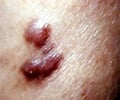Adding a novel monoclonal antibody therapy to traditional chemotherapy increased median survival by nearly a year in patients with advanced sarcoma.

‘Adding a novel monoclonal antibody therapy to traditional chemotherapy increased median survival by nearly a year in patients with advanced sarcoma, a lethal soft-tissue cancer.’





Adding a novel monoclonal antibody therapy to traditional chemotherapy increased median survival by nearly a year in patients with advanced sarcoma, a lethal soft-tissue cancer. Findings from a multicenter clinical trial of the combination therapy, led by researchers at Columbia University Medical Center and NewYork-Presbyterian, represent the first appreciable improvement in sarcoma outcomes in decades. The study was published online earlier this month in The Lancet.
"We estimated from preclinical data that the new drug - olaratumab - might improve survival in these patients by a few months, but the extent of the improvement exceeded everybody's expectations," said study leader Gary K. Schwartz, professor of medicine at Columbia University Medical Center and chief of the division of hematology and oncology at NewYork-Presbyterian/Columbia. "While sarcoma remains a fatal disease, we're encouraged that we're on the right track and hope to build on this progress."
Several years ago, Dr. Schwartz (then at Memorial Sloan Kettering Cancer Center) reported that a cell-surface receptor called platelet-derived growth factor receptor alpha (PDGFR-alpha) - found in many people with soft-tissue sarcoma - appeared to play a key role in tumor growth in specific sub-types of soft-tissue sarcoma. By inhibiting this receptor, he was able to get the sarcoma cells to stop growing in his laboratory.
Working in close association with scientists at ImClone, since acquired by Eli Lilly and Company, he developed the clinical trial with the agent olaratumab, a human monoclonal antibody that blocks PDGFR-alpha and disrupts this signaling pathway, which is critical for sarcoma growth. The drug was also shown to enhance the effects of a standard chemotherapy called doxorubicin, which is routinely used in the treatment of sarcoma.
Advertisement
"As an oncologist, I am ecstatic that the drug worked as well as it did," said Dr. Schwartz. "As a physician-scientist, however, I remain frustrated because we still don't know exactly why it worked as well as it did. It might be directly affecting the tumor cells, the tumor microenvironment (cells immediately around the tumor cells), or even the immune cells. The future development of this drug will be helped by figuring this out."
Advertisement
Eli Lilly recently completed a larger, phase 3 clinical trial of olaratumab, which included some of Dr. Schwartz's patients at Columbia/NewYork-Presbyterian. Results of the study have not yet been published. In the meantime, the FDA has granted the drug priority review as a potential treatment for advanced soft-tissue sarcoma.
Source-Eurekalert













